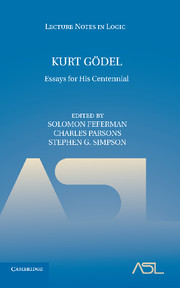Book contents
- Frontmatter
- Contents
- Introduction
- GENERAL
- PROOF THEORY
- SET THEORY
- PHILOSOPHY OF MATHEMATICS
- What did Gödel believe and when did he believe it?
- On Gödel's way in: The influence of Rudolf Carnap
- Gödel and Carnap
- On the philosophical development of Kurt Gödel
- Platonism and mathematical intuition in Kurt Gödel's thought
On the philosophical development of Kurt Gödel
Published online by Cambridge University Press: 04 August 2010
- Frontmatter
- Contents
- Introduction
- GENERAL
- PROOF THEORY
- SET THEORY
- PHILOSOPHY OF MATHEMATICS
- What did Gödel believe and when did he believe it?
- On Gödel's way in: The influence of Rudolf Carnap
- Gödel and Carnap
- On the philosophical development of Kurt Gödel
- Platonism and mathematical intuition in Kurt Gödel's thought
Summary
§1. Introduction. It is by now well known that Gödel first advocated the philosophy of Leibniz and then, since 1959, that of Husserl. This raises three questions:
How is this turn to Husserl to be interpreted? Is it a dismissal of the Leibnizian philosophy, or a different way to achieve similar goals?
Why did Gödel turn specifically to the later Husserl's transcendental idealism?
Is there any detectable influence from Husserl on Gödel's writings?
Regarding the first question, Wang reports that Gödel ‘[saw] in Husserl's work a method of refining and consolidating Leibniz' monadology’. But what does this mean? In what for Gödel relevant sense is Husserl's work a refinement and consolidation of Leibniz' monadology?
The second question is particularly pressing, given that Gödel was, by his own admission, a realist in mathematics since 1925. Wouldn't the uncompromising realism of the early Husserl's Logical investigations have been a more obvious choice for a Platonist like Gödel?
The third question can only be approached when an answer to the second has been given, and we want to suggest that the answer to the first question follows from the answer to the second. We begin, therefore, with a closer look at the actual turn towards phenomenology.
Some 30 years before his serious study of Husserl began, Gödel was well aware of the existence of phenomenology. Apart from its likely appearance in the philosophy courses that Gödel took, it reached him from various directions.
- Type
- Chapter
- Information
- Kurt GödelEssays for his Centennial, pp. 275 - 325Publisher: Cambridge University PressPrint publication year: 2010
- 1
- Cited by

